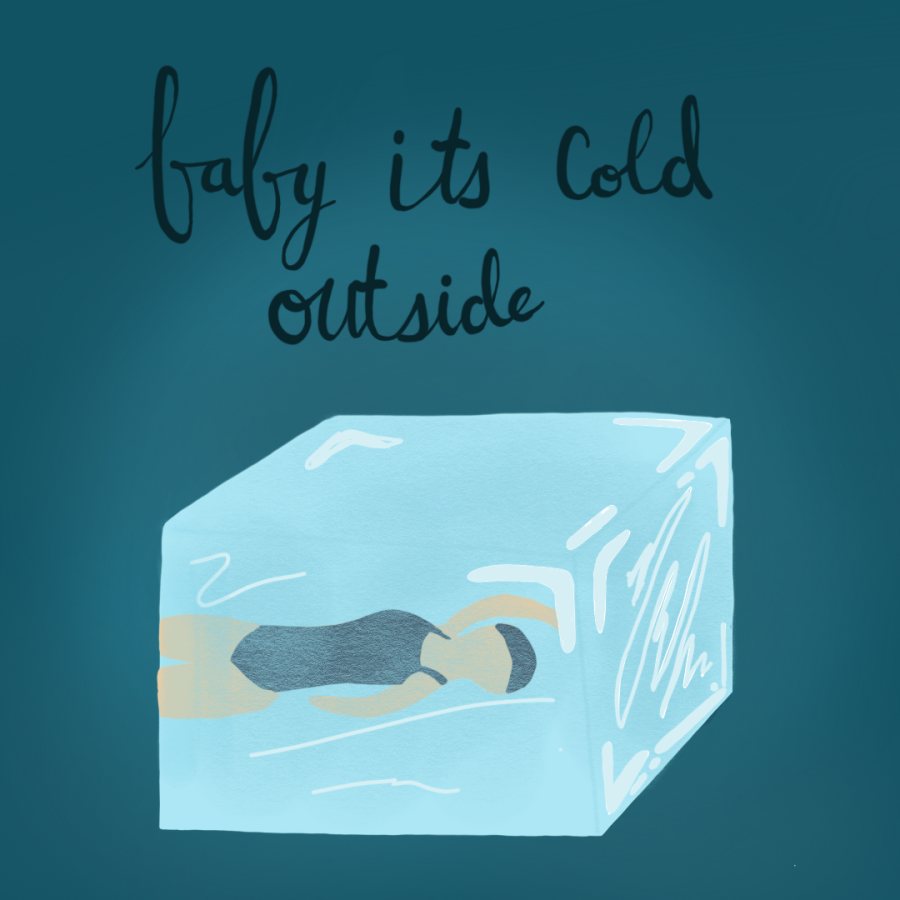Outdoor Swim Practice
December 15, 2022
Winter is here, and three months have passed since the beginning of school. The weather has been getting colder as we advance further into December. The winter weather can be described as chilly, damp, cold, and icy. However, swimmers continue to swim outdoors in this weather although they typically hate cold outdoor practices. Senior Zachary Bi says, “I remember Issaquah Swim Team outdoor practices in winter, and you would freeze into the water in about 10 seconds after getting out.” Swimmers may hate outdoor practices for the cold weather, but surprisingly it serves many benefits to a swimmer’s overall health.
Most swimmers on the Issaquah Swim Team have three to six outdoor practices. Freshman Aditi Kuthanoor says, “When we have rain, snow, hail, or heavy winds at practice we are usually distracted by that to some degree. I am not able to give my full concentration to swimming.” Extreme weather conditions can disrupt a swimmer and divert their attention away from swimming. However, it can greatly improve your mental health and studies show that it reduces stress and depression. According to Yobaba Lounge, “It dramatically improves mental health. Cold water swimming has been shown to improve concentration and memory function as well as reduce stress and depression. Studies show that people suffering from depression have experienced long-term relief from anxiety and stress after making cold-water swimming part of their regular routine.” Swimming outdoors in the winter is encouraged because cold water serves many unknown benefits.
However, outdoor pools need to be cleaned and maintained in ways such as covering the pool with a lid and vacuuming the pool floor. Pool maintenance gets harder in the winter due to cold weather. Kuthanoor says, “It is very annoying and bothersome. At the Klahanie Mountain View pool, there are always leaves that get in our way while swimming.” Cold water and neglect of the pool do not mean that the pool is harmful. Bi says, “When I used to do competitive swim I would rarely get sick.” Swimming in cold water does not make you sick. Instead, it improves your immune system, and you will be less likely to get sick. According to IPRS Health, “The effects of cold water on the immune system have been studied widely. Cold water helps to boost the white blood cell count because the body is forced to react to changing conditions. Over time, your body becomes better at activating its defenses.” Swimming in cold water should not scare anyone because there is nothing harmful about it, and it builds a stronger immune system.
Contrary to popular belief, swimming in the cold does not affect the swimmers’ overall performance. Junior Jae Lee says, “We just swim, unless it is raining severely. It doesn’t affect our performance. It can be uncomfortable and bothersome to swim in cold water, but our bodies can adjust to it.” At certain outdoor pools there are showers. However, some swimmers choose not to take a shower. Sophomore Chloe Dandeneau says, “We usually go home and take a shower, not at the pool, after practice. It is sometimes convenient to take a shower right after practice, but we do not have time. We directly go home.” These showers are barely used by swimmers and the showers can be broken sometimes. Even if there are showers, swimmers will often go home because pool showers have not been maintained since the pandemic. Kunthanoor says, “When I first joined Issaquah Swim Team, the girls would all shower and talk in the locker room after practice. But when the pandemic happened, we were no longer allowed to use the locker rooms and we just stopped showering. A lot of us also no longer have time to do that anymore.” It can be cold and uncomfortable when a swimmer does not shower after swimming. Especially in the winter, not changing into warmer clothes could make swimmers susceptible to the common cold. Therefore, showers should be accessible by swimmers as cold temperatures can increase the likelihood of getting sick outside the water. Lee says, “We can just swim at indoor pools during the winter and outdoors during the summer.” Swimmers prefer a warm temperature after practice because their body is warmed up in the water but not outside the water.
Swimmers despise outdoor practices because of the cold weather, yet in contrast, the coaches love outdoor practices due to the fresh air and view. Kunthanoor says, “If you were looking at our coaches’ point of view, the beautiful sunrise at Snoqualmie ridge at morning practice. Personally, I would rather not face the wrath of mother nature while wearing just a swimsuit.” Outdoor practices provide a wonderful panorama of nature in Washington, and the coaches absolutely appreciate the sight. Nevertheless, swimmers have rigid opinions on cold weather, swimmers may hate it because the benefits are unknown to them. However, some swimmers approve of outdoor practices due to the fresh air. Bi says, “The inability to see is a pretty great advantage. But in all seriousness, fresh air is nice.” Swimming is a great sport to relax and release stress, and having fresh air is a bonus when you swim outdoors.
Swimmers should not dread outdoor practices in the winter as it provides an abundance of health benefits. Not only do they bring benefits to your health, but you can also admire the gorgeous views as you swim. Next time you go swimming outdoors, appreciate the view and change your opinion on cold practices because they help your body’s defenses.

